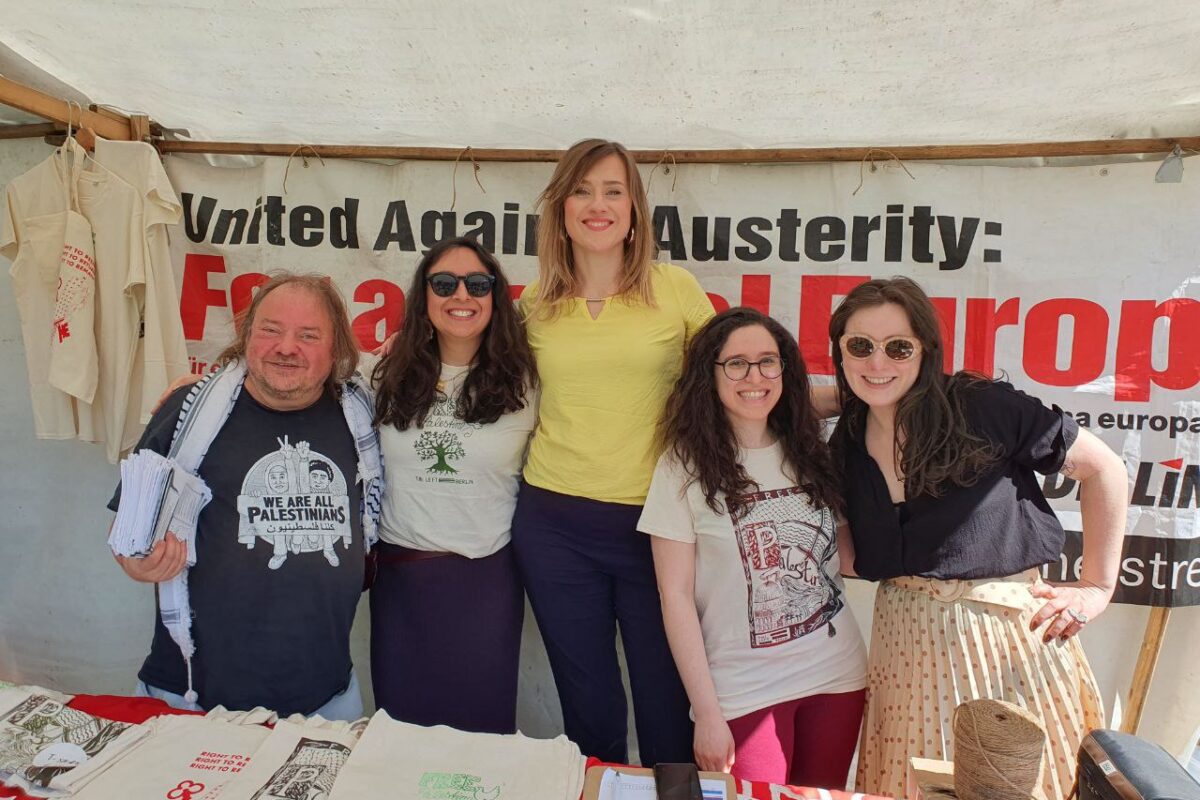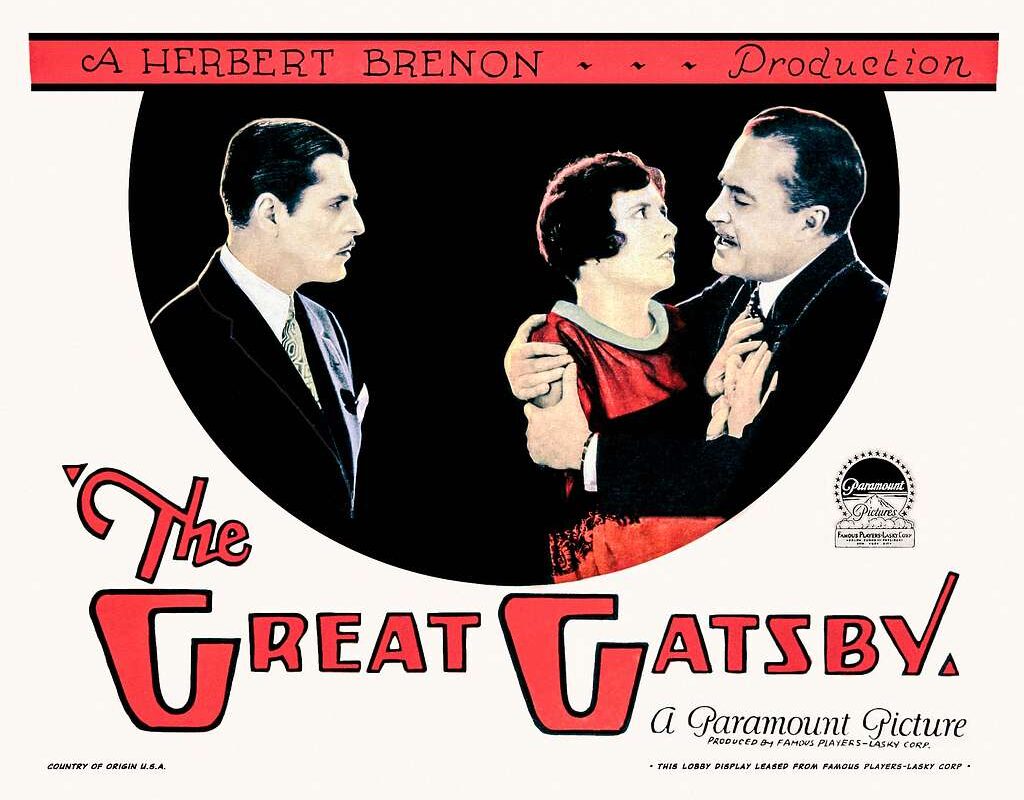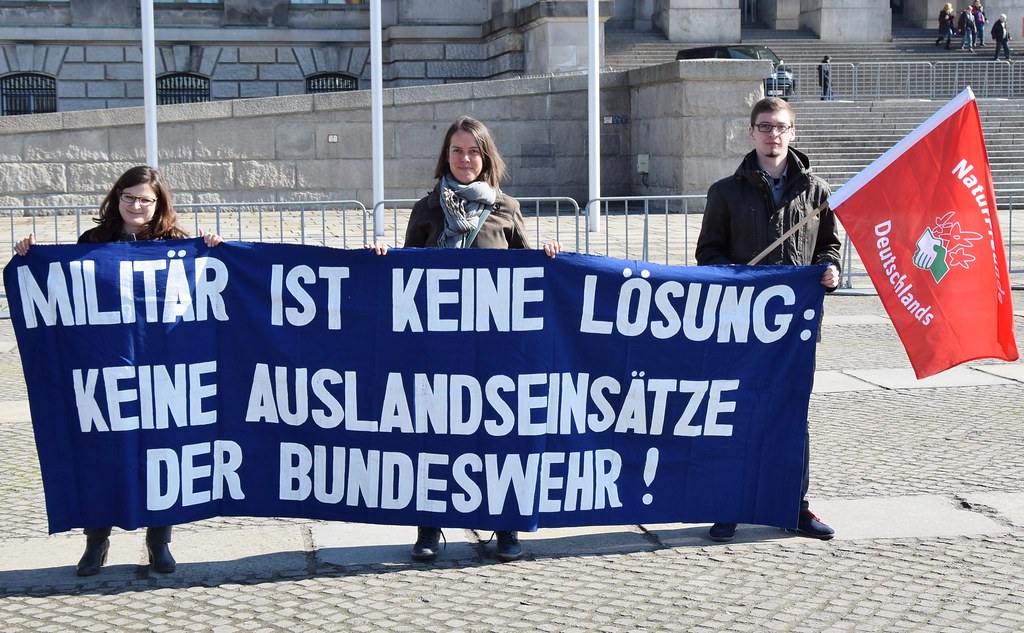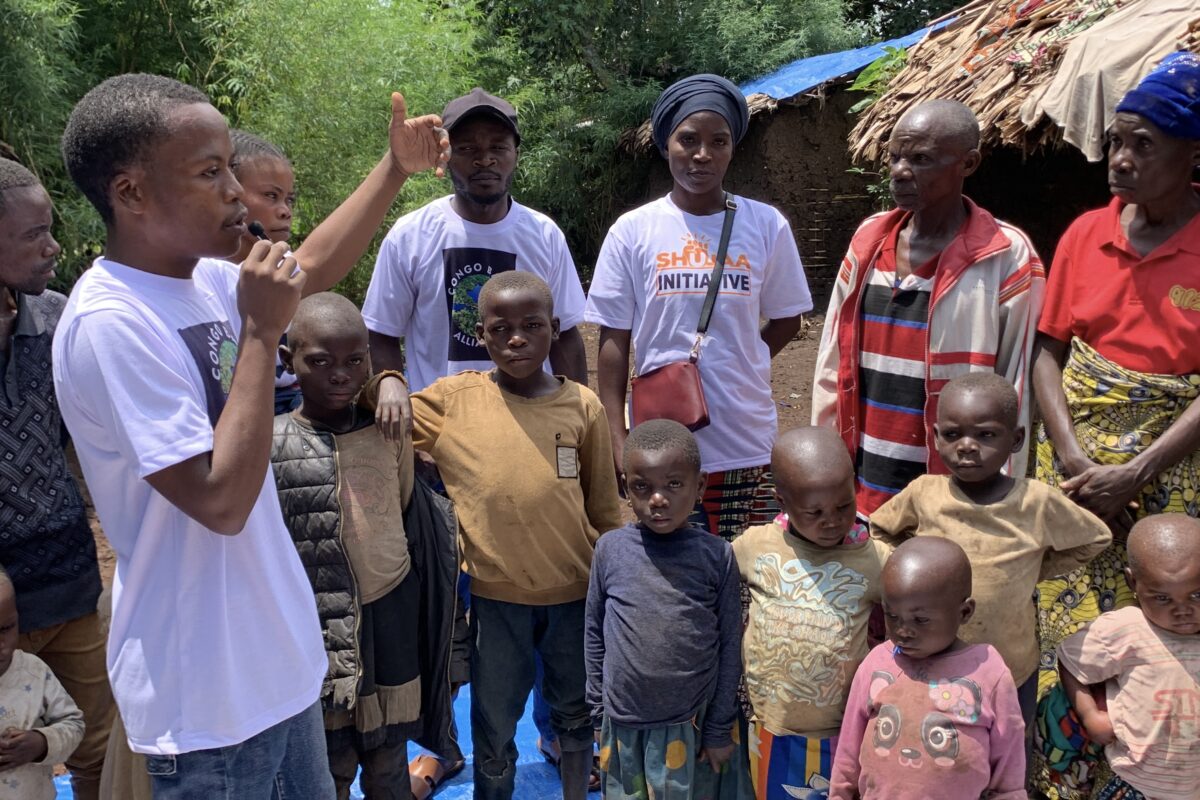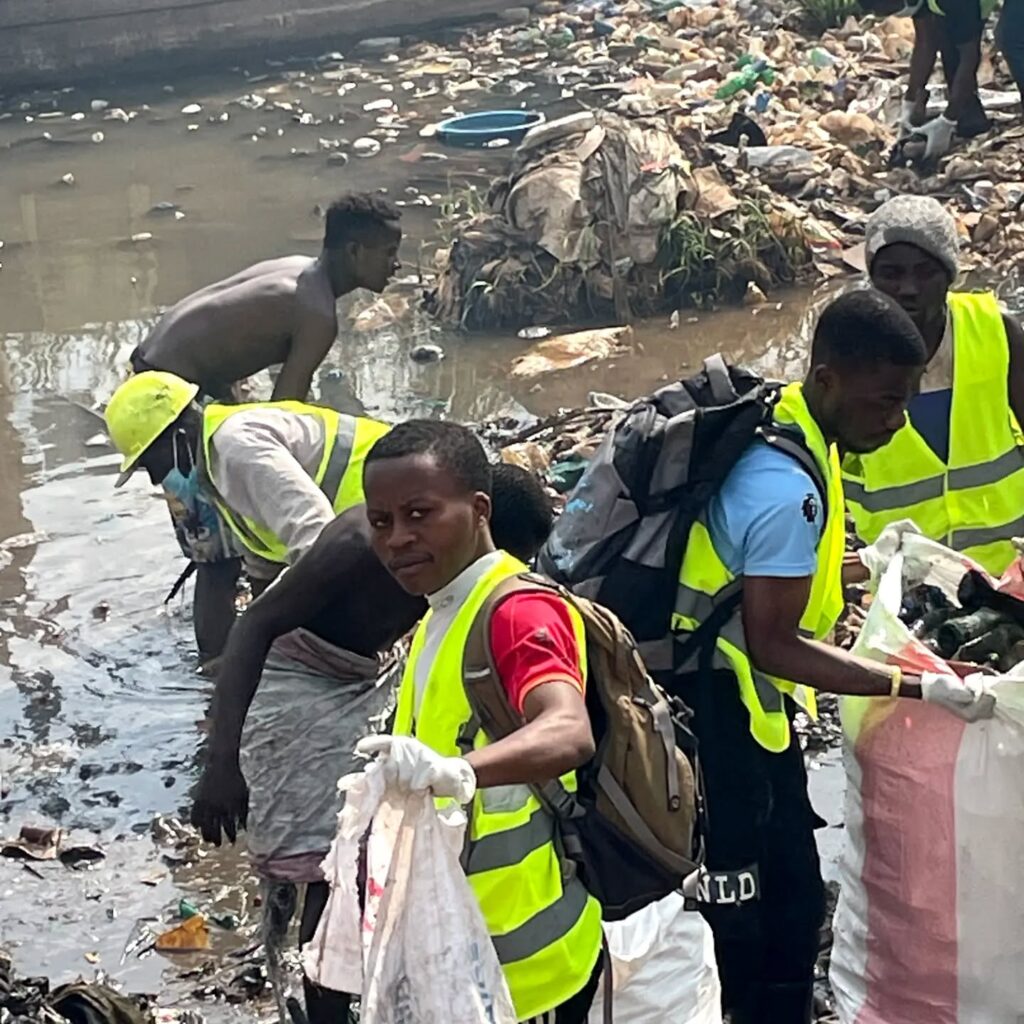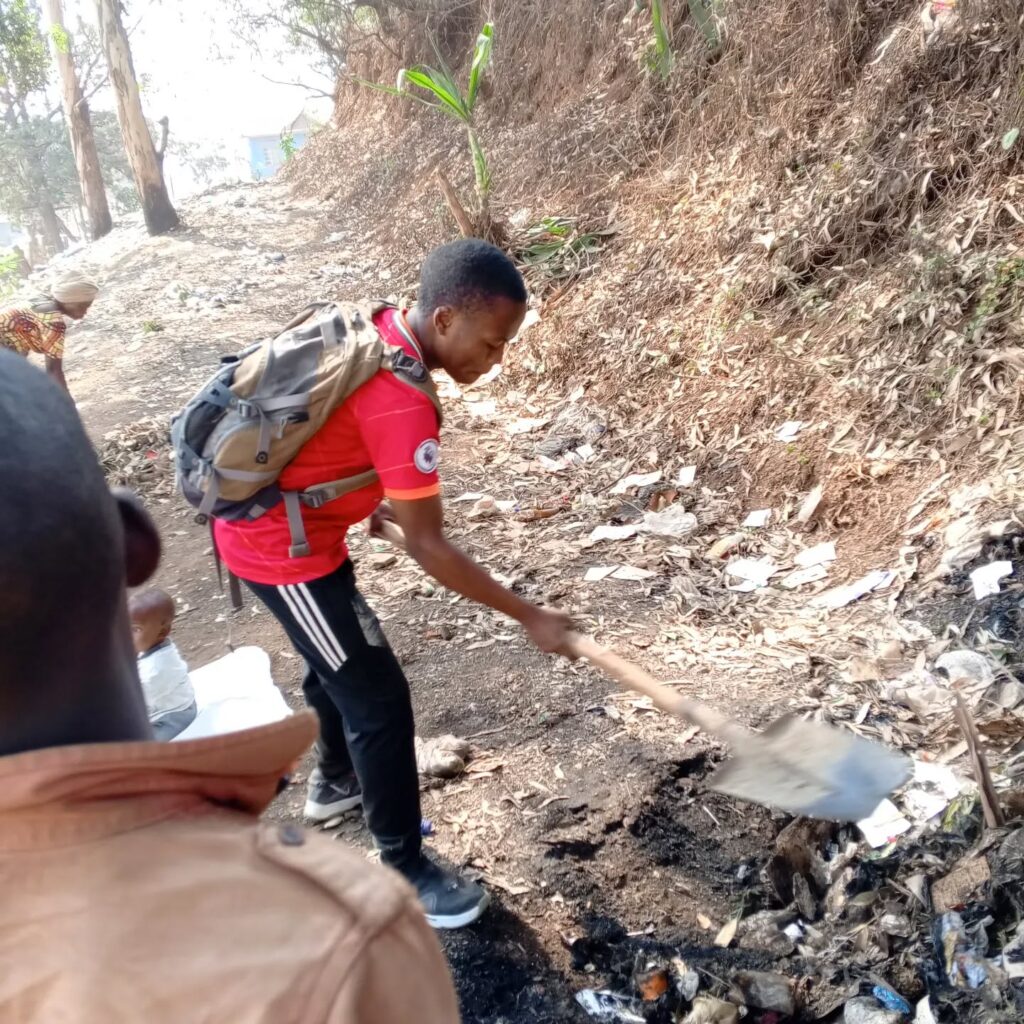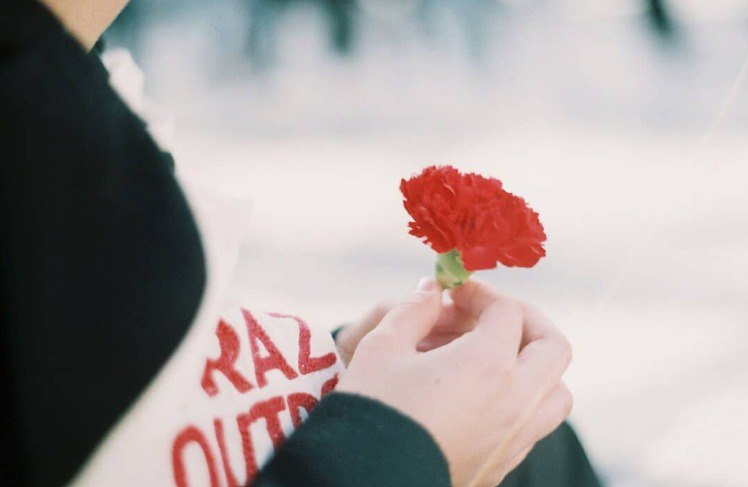The Left Berlin is organising a whole series of events in the next couple of months – so many, that it’s hard to keep an overview. This article summarizes everything we’re doing and why.
Early May
We’re kicking off May at the 1 May festival at Mariannenplatz, in front of the Bethanien building, where we will have a stall between 11am and 6pm. At the stall, you have the first chance to buy Palivision tickets (more below), as well as our new t-shirts and a leaflet explaining our upcoming activities (please take a bunch to give to your friends). It’s also an opportunity to meet the people behind The Left Berlin and talk to us about how you can get more involved.
At the festival, we will be holding a raffle with prizes including Palivision tickets, a t-shirt, and tickets for Gyrovision V, the boycott-friendly Eurovision Alternative, organised by the Corner Späti podcast and the Irish Bloc. We will be announcing the winners of the raffle at 6pm at the stall, but if you can’t stay that long, just leave your contact details, and we’ll let you know if you’ve won.
On Friday, 2nd May it’s our next Film Club, where we’ll be showing and discussing the film Tantura in the Agit buildings, Nansenstraße 2. We will continue to organise Film Club every month, and have a great programme planned. But we are negotiating a larger venue, which may need us to change the time and day. We’ll publish more information in our Weekly Newsletter as soon as we know more.
On Saturday, 10th May we’re co-organising the demonstration Social Spending instead of Military Spending. The demonstration has been organised as a response to Rheinmetall subsidiary Pierburg’s decision to convert their factory in Wedding to producing military hardware. The demonstration starts at S-Bahn Gesundbrunnen at 3pm, and will visit the factory before a final rally at Leopoldplatz.
On Sunday, 11th May, it’s our monthly Political Walking Tour. Our usual tour guide, Nathaniel, will not be in Berlin during May, so we will welcome back Izzy Choksey who used to give tours for us. Izzy will be taking us through the history of Social Movements in Berlin. The tour starts at 2pm at the Martin-Luther statue at Alexanderplatz (Karl Liebknecht Straße 8).
Palivision
Last year we had the idea of organising a solidarity concert for anyone who wanted to boycott the Eurovision concert because of Israel’s involvement. Within 4 weeks, we pulled together a concert with 12 acts and several political speeches, which raised €2,000 for the European Legal Support Centre. You can read our report on how we did it here, and see videos from the Event here.
One year on, Israel is still committing genocide in Gaza, and is still being treated as a normal state by the Eurovision organisers. So, on May 17th, we are organising Palivision 2. Some things will be the same as before – we welcome back Asper Casper and Uday Al Shihabi, who both contributed great performances last year, but this year the sets will be longer and we have more artists from the Middle East region.
We also have a new venue. We would like to offer particular thanks to K19, who stepped in at the last minute as our original venue cancelled on us (such is the experience of trying to organise a pro-Palestine event in Berlin). K19 is at Kreutziger Straße 19, near the Samariterstraße U-Bahn (U5). The event starts at 7pm. All proceeds from Palivision will be donated to the Palestinian Children’s Relief Fund (PCRF).
You can reserve your Palivision ticket online and pick it up at any of our events, starting with our stall at the 1st May festival. There will be a small contingent of tickets available at the door.
Küfa and Talk on Jihadi Music
On Sunday 25th May, we will be holding a Küfa (kitchen for all) in Bilgisaray, Oranienstraße 45. Cook together, eat together, and meet international activists in Berlin. The money raised at the Küfa will be used to finance The Left Berlin activities. We work on 100% voluntary labour and are not funded by any political organisations or NGOs. Simply running our website and newsletter costs money, which we must find somewhere.
As part of the Küfa, we are pleased to welcome Asha Vare who will give the talk Jihadi Music? Towards a Framework for Understanding Music Associated with Palestinian Armed Resistance. The talk is based on Asha’s research at Cambridge University and was first given at the British Forum of Ethnomusicology’s annual conference.
In the talk, Asha will be exploring the meaning of songs associated with armed resistance for Palestinians living in the West Bank, looking at genre-labels as discourse – examining the motivations and implications of terminology to describe music, and challenging North Atlantic research conventions and characteristics of Palestinian music and resistance.
Food will be available from 5pm and Asha will be speaking at 7pm. If you’d like to help with the cooking, please come a little early. All donations will be appreciated. It is events like this which enable us to carry on doing what we do.
Journalism Day School
Saturday, 31st May sees the return of another old favourite. In 2021 and 2022 The Left Berlin editorial board organised two day schools open to experienced journalists who wanted to share their experiences and new writers who were looking for some tips. You can read about the results here and here. We’ve decided to organise another Left Journalism Day School, this time in Karl Liebknecht Haus on Rosa Luxemburg Platz.
Come to talk about everything from using Canva to make online pictures, to writing book and film reviews, from videos on social media, to conducting an interview. Particular highlights include Nick Babakitis from Corner Späti talking about how to make a podcast, and Palestinian journalist Farah Maraqa on political journalism – particularly ethics and norms.
The Day School will conclude with a keynote speech introduced by Palestinian journalist Hebh Jamal and Tina Lee, editor-in-chief of Unbias The News. Hebh and Tina will be speaking on how the media manage consent, paying particular attention to how the German media portray Palestine. Participation at the Journalism Day School is free, but book your place early to ensure there is space for you.
Summer Camp
Once a year, The Left Berlin spends a week-end in the countryside discussing politics, socialising, and having fun. This year’s Summer Camp will be on 7th – 8th June and in a new venue – the Haus des Wandels in Steinhöfel. Please note that this is more remote than our previous venue, so it’s easier if you sleep over, but free accommodation is available on site.
As usual, Summer Camp is a mixture of small workshops and big talks. The first major talk is the kick off for a series of meetings we are planning with the Bloque Latinoamericano on The Left After the German Elections. Early advertising for Summer Camp said that we had invited Ferat Kocak, a regular visitor of Summer Camp, to speak. Unfortunately, Ferat is on holiday that week-end so we’re still working on the speakers.
The second major talk will be on Repression against Palestinians and their allies in Germany. Confirmed speakers so far are Palestinian refugee activist Majda Qandil and a representative of the Irish Bloc. We are in talks with Benjamin Düsberg, the lawyer representing the Berlin4 who is being threatened with deportation for their pro-Palestine activities, and hope that Benjamin will confirm soon.
There is also a series of workshops from Germany, Namibia, and reparations to Reproductive Justice, taking in organising migrant workers, decolonial feminism and Myanmar. You can see a list of planned workshops in the Event description. Note that we are still in the process of booking speakers, so dome subjects may change.
We need to be aware how much food to provide at Summer Camp so will be asking for a contribution for the food in advance. More information soon in our Newsletter and on our website.
Regular Events
On top of all this, we will continue to organise our regular events, like our Book Club, Reading Group and Political Walking Tours. We also have monthly meetings to plan our activities open to anyone who is interested in what we do (more information about this in the next section).
In Book Club, we go through a book, discussing each chapter. In the current Book Club we are discussing Walter Rodney’s How Europe Underdeveloped Africa. We will be discussing chapter 5 on Sunday, 11th May, and the final chapter on Friday, 23rd May. Book Club usually takes place on the second and fourth Sunday of the month (note the different day on May 23rd to avoid clashing with our Küfa) in the Agit buildings, Nansenstraße 2.
In our Reading Group, we discuss a series of texts about a suggested subject. On 16th May, we will be discussing How to effectively fight against Fascism, and on 13th June Decolonial Feminism. The Reading Group normally takes place on the third Friday of the month, also in Agit. Subjects for both Book Club and the Reading Group are taken in a Telegram group for regular attendees. If you come to any meeting, we can add you to the group.
On Sunday, 15th June, Nathaniel is back for the next Political Walking Tour. To celebrate the anniversary of the 1953 East German workers’ uprising, we will be visiting sites important in the development of East Berlin. The tour starts at 2pm at U-Bahn Strausberger Platz, outside the exit to Andreasstraße (in front of Andreasstraße 46). The Political Walking tour normally takes place on the third Sunday of the month.
Get Involved
The Left Berlin is an informal and independent group of mainly non-German international activists based in Berlin, and we are always looking for people to join us and get more involved. On the first Monday of each month we have a Coordinating meeting to plan our activities in Ferat Kocak’s office, Schierker Straße 26. The meetings are open to anyone who is interested in our activities.
The website theleftberlin.com and Newsletter are run by an Editorial Board which has a weekly online meeting and an extended face-to-face meeting roughly once a quarter. If you are a writer, translator, editor, or would like to be one, please contact us at team@theleftberlin.com. We also accept pitches for articles (you can read some guidelines here).
If you have any ideas about how we can improve our work or the website and Newsletter, please contact us either by e-mail or by visiting any of our events, starting with our stall on 1st May. You can also keep informed about what we are doing by subscribing to our Newsletter, which goes out every Thursday lunchtime, joining our Telegram info channel, or following us on Instagram.
